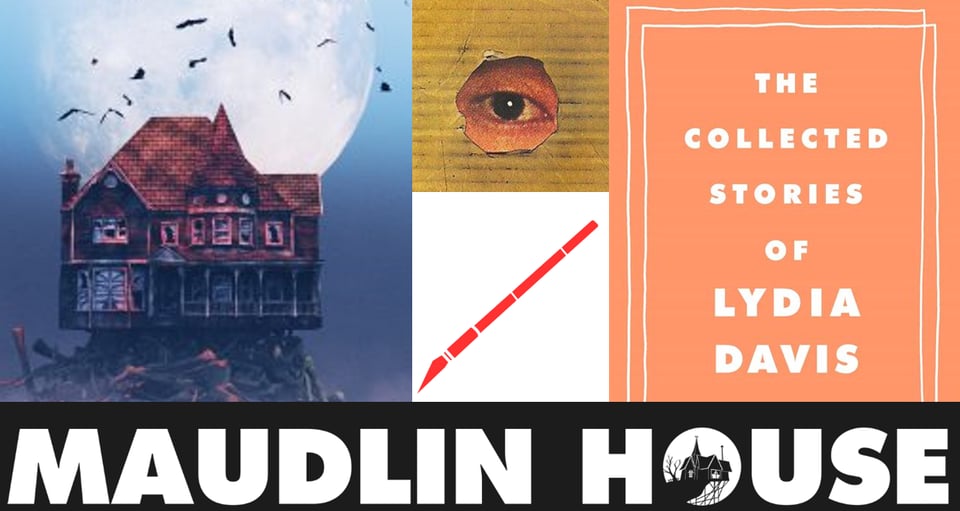SHORT STORY REX June 2024

Short Story Rex, June 2024
1. “The Abandoned”, Jack Klausner
It was just sitting there in the dead leaves, she says.
I tell her she shouldn’t pick up things that don’t belong to her. She says the box doesn’t belong to anyone. It was abandoned, she says, like I’m stupid, and maybe I am.
Familial horror, about the unknown recesses in the people around us and in ourselves, told in a terse present tense that's understated yet urgent. The cruelty and the poignancy really snuck up on me, even on a second read. Another great one from Jack Klausner.
2. “I went in my therapist’s office and she was dead,” Tyler Dempsey
Months ago now (like, last autumn I guess you’d say from the vantage point of June '24), this flash piece in Maudlin House was quite divisive in online spaces where i sometimes hang. And if language is a virus from outer space, this story has me infected to this day, transforming my brain into a machine which is designed for one thing and one thing alone, and that is saying the word "Terrible!" to myself. If this goes on, i am afeared i may end up like our protagonist. A happy ending, despite the blood?
3. “The Knife Decides”, R.L. Summerling
Is it possible that I’ve never done an R.L. Summerling joint here? Allow me to rectify this egregious oversight: this story paints a comprehensive landscape, a bleary-eyed depiction of decadence, of decay, with a whole lot of interpersonal animus and, dare I say it, worldbuilding packed into this claustrophobic traincar of a story. Definitely feels heir to a certain strain of classic British anti-”sci fi”, and the fact that the character names are all “H—-”, “P—-”, “G—-”, adds an anachronistic nuance to the weird dystopian vibe. Lovely, dread-provoking stuff
4. "Five Signs of Disturbance", Lydia Davis
I must have passed up The Collected Works of Lydia Davis in a dozen bookstores in favor of other volumes, so I was happy to find a copy in a local library here recently. I have to admit, I'm having trouble imagining a world before this book (I guess before 1987's Break It Down, technically). There is a whole set of literary moves on display here which, while certainly not original to or unique in Davis, nevertheless feel original and unique for some hard-to-define reason? Would they have felt that way in the late 80s, I wonder? Either way, there's a truth of lived experience behind the formal playfulness and telegrammatic reportage of neurotic thoughts and conducts which, in the reififed publishing category known today as "flash fiction", can often feel false and commonplace by comparison.
"Yes, we know, Nicky," you say. "Lydia Davis good. And?" Well, specifically, I just wanted to highlight in particular this one story ("short", not "flash") for the way the psychology of it edges into weird almost-horror, which readers of this newsletter are probably predisposed to dig.
Another night it is her lungs; she shuts her eyes and her lungs seem as large as the room , and as dark, and enclosed in a fragile shell of bone, and in one dark lung she is crouching and the wind whistles around her, in and out.
Some things in her behavior now strike her as odd. Then something happens that should frighten her, but she is not frightened."
Not-short story rec: The Box Man, Kobo Abe
My first Abe. Goddamn, what a profoundly confounding book. Starts off with a deceptively simple premise:
This is the record of a box man. I am beginning this account in a box. A cardboard box that reaches just to my hips when I put it on over my head. That is to say, at this juncture the box man is me. A box man, in his box, is recording the chronicle of a box man.
What is a box man? Some sociological specimen, completely Abe’s invention, one that he sets forth convincingly—at first. Except that, within the next dozen or so pages, Abe has begun to aggressively and matter-of-factly undercut just about everything he’s asserted in that introduction, every aspect of the box man's narrative, and the reader is left to piece together an obsessive meditation on the yearning for connection and the fear of exposure, the assuming and discarding identities, the relation of Subject and Object, of seeing and being seen, and a long et cetera.
A box, in appearance, is purely and simply a right-angled paralleliped, but when you look at it from within it’s a labyrinth of a hundred interconnecting puzzle rings.
I need to read some more Abe but i feel like first i need to take a break from Abe if that makes sense